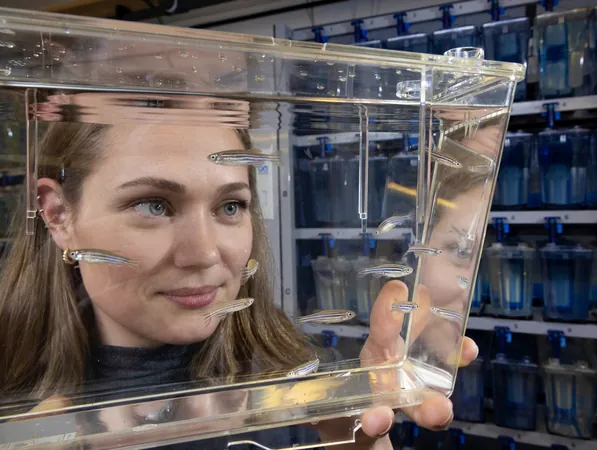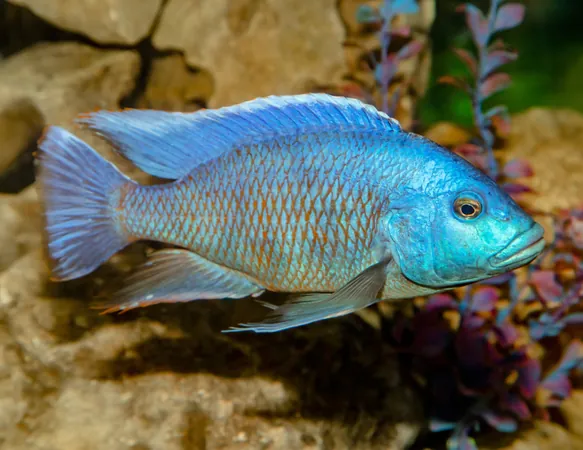
Zebrafish Breakthrough: Bred for Heat, Thrive Without Trade-offs!
2025-05-14
Author: Mei
As global temperatures rise, countless species face unprecedented challenges, particularly aquatic creatures like fish whose survival hinges on their surrounding water temperatures. With climate change threatening ecosystems worldwide, how can fish adapt to these sweltering conditions?
A Game-Changing Study on Heat Tolerance
In a groundbreaking study published in *Nature Climate Change*, researchers at the Norwegian University of Science and Technology (NTNU) have taken an incredible leap forward by breeding zebrafish over seven generations to withstand higher water temperatures. Senior author, Fredrik Jutfelt, stresses the uniqueness and importance of this research, noting the time and resources required to perform such extensive experiments.
Unexpected Findings: Thriving in Heat and Cold
To the researchers' astonishment, the heat-tolerant zebrafish exhibited not only resilience in warmer waters but also enhanced tolerance to colder temperatures! Anna Andreassen, the lead researcher, remarked, "Typically, warm-adapted species show lower cold tolerance. Our findings challenge this norm." This dual adaptability could be key in their survival as climate conditions become increasingly erratic.
Investigating Metabolic Effects
In the pursuit of understanding the broader effects of heat tolerance, the team analyzed whether this trait would compromise the fish’s metabolic efficiency or reproductive success. Surprisingly, they discovered no significant trade-offs in metabolism or reproductive capabilities among the different zebrafish groups.
Diving into Oxygen Dynamics
The researchers conducted tests to compare oxygen consumption across the different groups of zebrafish—those bred for high heat tolerance, a control group, and those bred for low heat tolerance. Despite expectations, the high-heat group did not exhibit improved oxygen utilization, countering a popular hypothesis that oxygen availability might limit species under warming conditions.
Swimming Towards Success
Further tests revealed that the enhanced heat-tolerant zebrafish maintained their performance metrics, including growth and reproductive success, even in higher temperatures. While the study did not find definitive trade-offs, it opens new avenues to explore how these fish might cope in a warming future.
A Glimmer of Hope Among Global Warming Challenges
Despite the urgency of climate change, this investigation into zebrafish adaptations provides critical insights into potential resilience mechanisms. As researchers globally scramble to understand how both flora and fauna might adapt, these findings might just illuminate a pathway for survival. Ultimately, while rapid evolution in the wild may be unlikely, understanding physiological changes is vital to addressing the broader implications of climate change on marine life.





 Brasil (PT)
Brasil (PT)
 Canada (EN)
Canada (EN)
 Chile (ES)
Chile (ES)
 Česko (CS)
Česko (CS)
 대한민국 (KO)
대한민국 (KO)
 España (ES)
España (ES)
 France (FR)
France (FR)
 Hong Kong (EN)
Hong Kong (EN)
 Italia (IT)
Italia (IT)
 日本 (JA)
日本 (JA)
 Magyarország (HU)
Magyarország (HU)
 Norge (NO)
Norge (NO)
 Polska (PL)
Polska (PL)
 Schweiz (DE)
Schweiz (DE)
 Singapore (EN)
Singapore (EN)
 Sverige (SV)
Sverige (SV)
 Suomi (FI)
Suomi (FI)
 Türkiye (TR)
Türkiye (TR)
 الإمارات العربية المتحدة (AR)
الإمارات العربية المتحدة (AR)